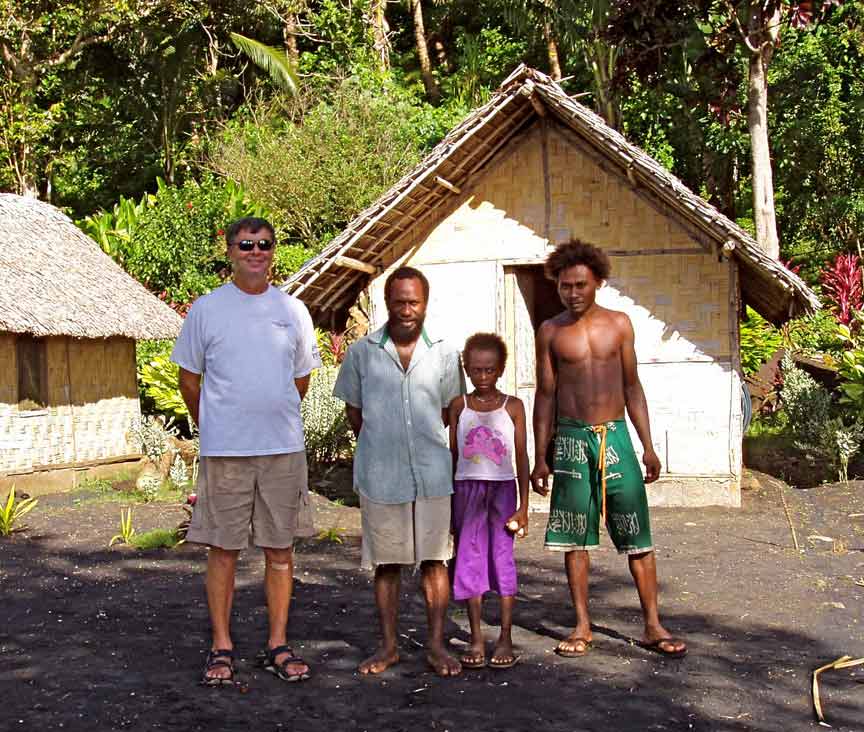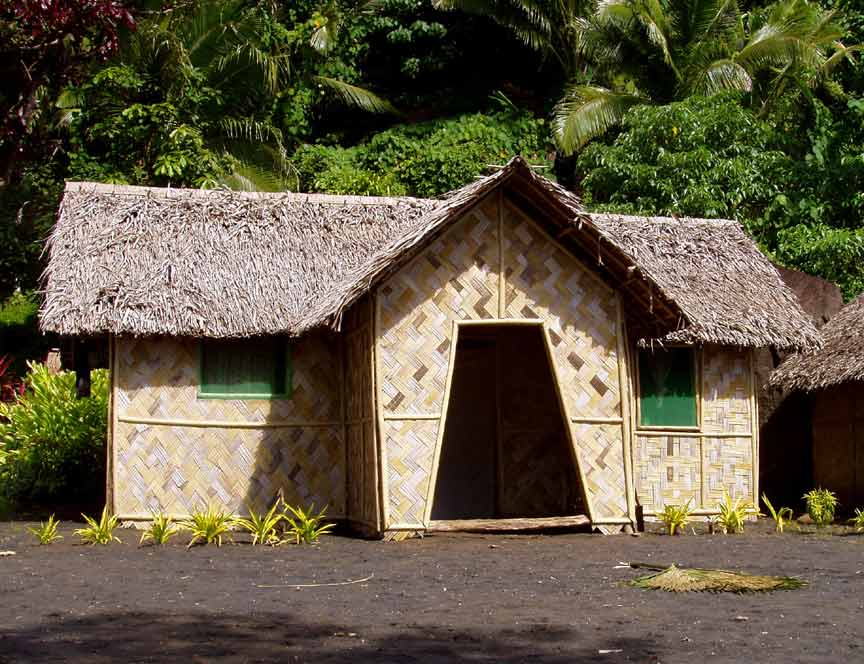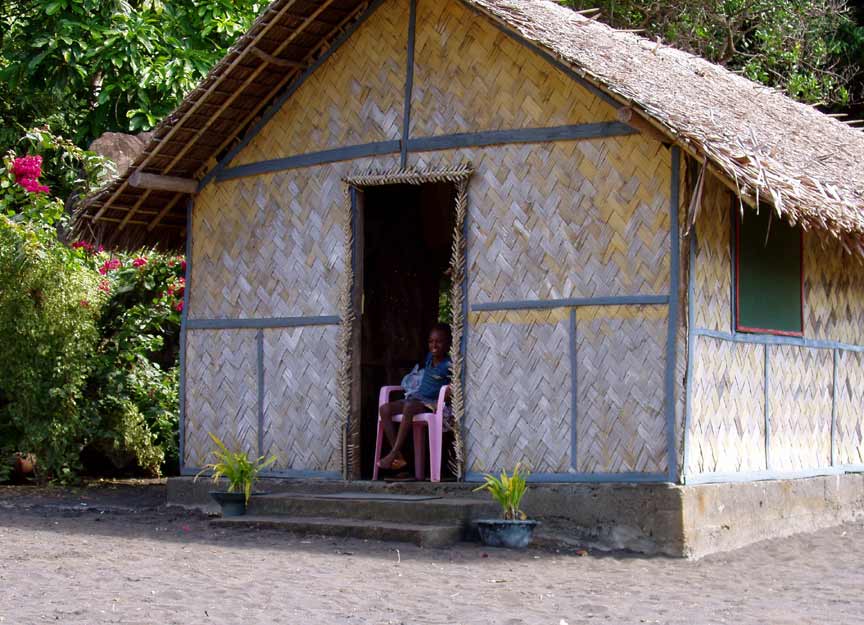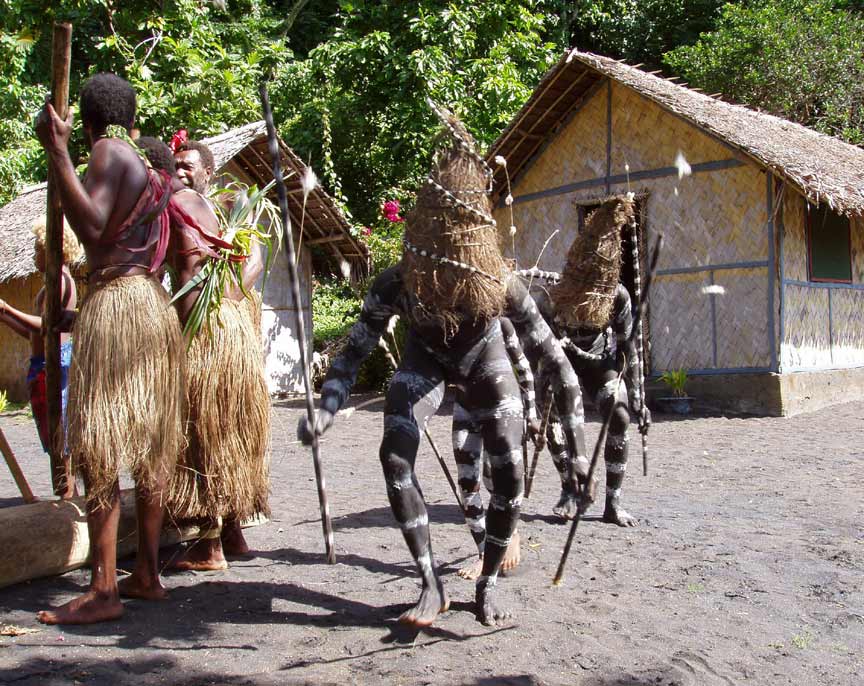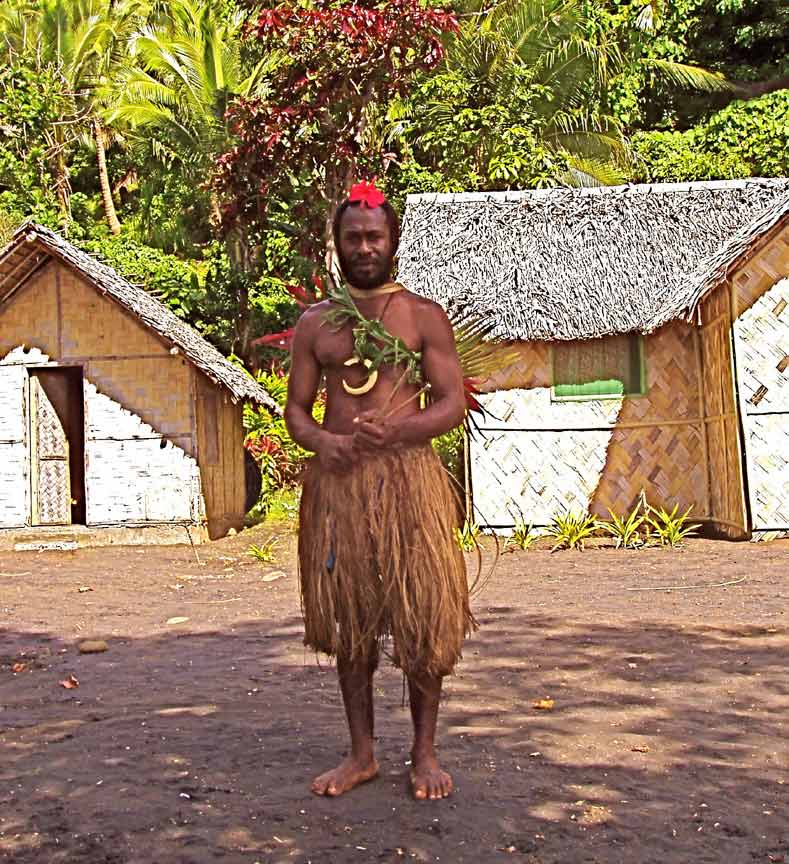Chief Kerely, the Snake Dance and Vegetables in Waterfall Bay, Vanua Lava, Vanuatu

Harmonie
Don and Anne Myers
Tue 19 Aug 2008 23:13
|
13:49.627S 167:22.875E
Sorry for the delay, we've been enjoying
civilization in Port Vila and neglecting our normal boat duties - like blog
writing. We didn't even realize the Olympics were going on until we sat
down at the waterfront bar and looked up at the big screen TV to see the
all-around women's gymnastics competition on display. I'm not sure how
thrilled Don was to be watching women's gymnastics, but I found it
fascinating. Actually, in our TV and general news deprived state, I think
Don truly enjoyed the gymnastics too - although I'm not sure he would
admit it to anyone at home.
Now that we are in Port Vila, it's hard to imagine
that just a few days ago we were sitting with the chief outside his thatch hut,
watching his family and the other villagers build new thatch structures
from parts of palm trees in preparation for an upcoming festival, and
discussing ways to use the nearby waterfall to generate enough electricity to
run a few lights for the villagers to use at night. Yup, hard to imagine,
but here goes...Sorry in advance - this is a long one.
On Friday 8/8, we left Losalava on Gaua Island with
the intention of going to Sola, the main town on Vanua Lava Island and also the
port of entry where we needed to visit customs and obtain a new cruising
permit. As mentioned in the previous blog entry, the weather wasn't
cooperating, so instead of beating into the wind to Sola, we gave up and pointed
toward the west side of the island and Waterfall Bay. We arrived at about
five o'clock that afternoon, once again the only boat in the bay. It
wasn't long before the Outrigger Alert was sounded. Don greeted Paramount
Chief Kerely Malau on deck while I scrambled out of my shorts and into a
more acceptable pair of crop pants. With my thighs properly covered,
I joined Don in greeting the Chief.
The Chief welcomed us to the bay, said
we could swim and snorkel and visit the twin waterfalls as well as the
yacht club and restaurant. Other activities were available for a price,
with a guide provided. He asked how long we would be staying and in the
next breath asked if we had email on board. When we told him we would be
staying three nights and yes, we had email, he politely asked if we would be
willing to send an email for him. We said no problem and the
Chief paddled back to shore to prepare the email with a promise to be
back by 'half five'. We grimaced a little bit as we were looking forward
to a quiet happy hour in the first non-rolly anchorage we had experienced
since Peterson Bay six nights before. We postponed happy hour and the
Chief was back in his canoe as promised at 5:30 with his hand-written email and
Eddie, who we later decided was the Chief's right-hand man and general
all-around pal. I typed up the email while the Chief softly talked to Don
(all the ni-Van people talk softly - there is positively no yelling in
Vanuatu). Eddie, meanwhile, sat quietly and didn't say a
word.
The Chief had brought with him the yachtless yacht
club 'programme', which was a thin binder with several plastic covered sheets
inside printed with various things like the yacht club rules, the restaurant
menu and a price list of activities and tours. Having been to Lakona Bay
on Gaua Island where all they had were soggy visitor's books and word-of-mouth,
the presentation of this information in an organized fashion and professional
manner was really impressive. Impressive, especially after the Chief
apologized for his poor English (it was very good) and stated that he had only
gone as far as year three in school (3rd grade). The Chief had obviously
received assistance from yachties that had visited Waterfall Bay before us and
printed the information for him using their computers, but knowing this didn't
take away from the fact that he was industrious enough to come up with and
implement the idea in the first place.
The yacht club menu was simple (it had to be since
once again there were no roads, no boats and therefore, no supplies) and went
something like this:
Breakfast: freshly baked bread / eggs /
tropical fruits / cattowit / tea or coffee
Lunch and Dinner: island food/rice, fresh
water prawns, lobster (crayfish), fruits, chicken or rooster, fried
fish
We never did find out what cattowit was, or what
exactly 'island food' was comprised of, but the rest wasn't far from what we had
on board anyway. We didn't sample the restaurant, but we did sail away the
following Monday with an entire collection of vegetables. More on that
later.
The email the Chief asked us to send for him was
addressed to a husband and wife on a catamaran. It was a little difficult
to tell from the way the letter was written, but we think the Chief was asking
the yachties if they had received his quote for a fiberglass boat and outboard
for the villagers to use for fishing. It seemed like he was fishing for
the funding of a fishing boat. We
never did receive a reply to the email. Hmmm....
After the Chief finished going through the yacht
club information with Don and we agreed to come to shore in the morning, he and
pal Eddie climbed back into the Chief's outrigger and paddled away in the
descending darkness. We enjoyed our delayed happy hour on a boat that was
thankfully not bouncing, rolling or moving in any way that could remotely be
described as annoying. We marveled over how dignified the Chief was in his
quiet soft-spoken way - and how progressive he seemed to be within the confines
of his people's traditional lifestyle. Don asked if I had noticed what the
dignified Chief was wearing.
'Just a short sleeve shirt and a pair of cut-off
shorts, wasn't he?' I asked.
'Yes, but did you notice what was on the shirt?'
asked Don.
'Nope.'
'It was the top half of a McDonald's uniform.'
'No way.'
'Yes, it was. Golden arches and
all.'
'Too funny! How ironic.'
And it was. To us anyway. We are
certain the Chief had never visited a McDonald's (believe it or not there are
none in Vanuatu), nor even knew of its existence. If so, he might not have
been so willing to sport its uniform. In fact, he wore that shirt not only
on Friday, but Saturday and Sunday as well. When he saw us off on Monday
morning, we were happy to see he had changed into a different, non-McDonald's
shirt.
Saturday morning we went ashore as planned and the
Chief's pal Eddie met us on shore and helped pull the dinghy up on the
black sand beach. We entered the thatch yacht club, where flags from
yachts that had visited hung from the ceiling along with a few handmade baskets
for sale. On the concrete floor was a long table and some pink plastic
chairs. All in all, quite luxurious compared to the small thatch huts with
mud floors we had seen in Lakona Bay. The Chief, his wife Elizabeth
(dressed in her Sunday best Mother Hubbard), their three daughters and adopted
son were waiting for us when we arrived. The Chief indicated that we
should stand on one side of the table while he and his family stood on the
other. 'We will sing you a welcome song now.' he said. And they
did. To the tune of 'My Country 'Tis of Thee', but with words appropriate
to Waterfall Bay and welcoming yachties. You just don't get this kind
of treatment everywhere, now do you?
After the welcome song, the Chief motioned
for us to sit down. I reviewed the yacht club 'programme' while
the Chief asked Don if he had any questions about Vanua Lava, Waterfall
Bay or the customs and traditions of the people. In his soft-spoken
way, the Chief acted just a bit uncomfortable when the questions came from
me. It was clear he much preferred to talk to the man of the family since
his answers to my questions were always directed to Don. I secretly
forgave the Chief for this knowing it was just a cultural thing
and probably wasn't meant to be taken personally. We learned
that the Chief was not elected by the people, but instead was elevated to
his position through the traditional grade-taking process. The Chief
was a little vague when he explained how this was done...
Don: How many grades of Chief are
there?
Chief: Twelve
Don: And you are a grade two?
Chief: Yes and there is one
other grade two Chief on Vanua Lava as well.
Don: So there are no Chiefs higher than
a grade two?
Chief: No.
Don: How do you advance to higher
grades?
Chief: I have to learn the traditional ways
and customs and prove that I have learned these things.
Don: Who do you learn these things from if
there are no higher grade Chiefs?
Chief: This is a problem.
Don: Do you learn from the older people that
remember the old ways?
Chief: Some, but many have died.
This is the problem in Vanua Lava and probably
other parts of Vanuatu as well. When the missionaries arrived in the
1800's, they called for all native customs and worship practices to stop.
Some of this was good as it put an end to cannibalism and inter-tribe
fighting in the Vanuatu islands, but much of the other customs, culture and
verbal history of the people was lost. The Chief's elder brother has spent
over twelve years researching 'the old ways' on Vanua Lava and some of the other
islands by interviewing the elderly. Nothing is written, so the
only way to gain insight is through the memories of older people. This is
not an easy task given that less than three percent of the Vanuatu population is
over 65 years old. There just aren't that many older people around.
As a result, the Chief is striving to preserve the old ways and adhere to
tradition, without fully knowing what those traditions are. Kind of a
strange position to be in, but it seems he is doing his best with the
help of the research his brother has
done.
After our lesson in Vanuatu customs, we
finished reviewing the yacht club 'programme' and chose to see the old
cave paintings and hear Waterfall Bay's version of water music.
The Chief's brother was assigned to take us to
see the cave paintings and led us up the steep semi-path to the sacred
site. He explained that the people used to live in caves, hidden high in
the bush, because of the protection they provided from the elements as well as
from other unwelcome tribesmen. He didn't know how old the paintings were
and it looked like the painted figures had been retraced with new lime
paint in the recent past because they were so vibrant (picture 1). The Chief's
brother said no one from the village is allowed to see the cave paintings.
Only visitors, the Chief and he were allowed to the sacred site. We
decided there must be some logic to this rule, but we failed to see
it.
The Chief's brother then took us to see the famous
twin falls of Waterfall Bay. Definitely the prettiest waterfalls we have
seen so far (picture 2). They are so perfectly formed that they look fake
- like the manmade streams and falls that adorn extremely ritzy resorts in
places like Hawaii and the Caribbean. The falls are about 150 feet tall
and the pool at their foot is a perfect circle of clear fresh water with an
outlet that flows the short few feet directly into the sea. We couldn't
see the falls from where our boat was anchored, but we could hear their roar and
when the wind was just right, we were showered with their cool spray. Not a bad
thing at all.
In the afternoon, we came back to the village to
see (hear) the water music. The Chief led us back to the pool beneath the
waterfalls where his wife, sister, daughters and yes, his pal Eddie waded
into the water. It seems that although it is taboo for a woman to show her
thighs in Vanuatu, showing anything above the waist is fair game. The
Chief's wife (five months pregnant and all) and daughters entered the water
topless and his sister wore only a lacy black bra (which had difficulty staying
in place once the water music began in earnest, much to her and the Chief's
wife's amusement). At this point Don accused me of being sexist since I
had no problem taking pictures of naked little boys and grown men's dancing
butts. He's right. I just couldn't take pictures of the Chief's
topless family. Sorry guys. If it makes you feel any better, the
water music was a disappointment anyway. Not only was
it difficult to hear due to the roar of the falls, but it really was
nothing like what we heard in Lakona Bay - not even close. The Chief's
family 'played' only one rhythm a couple of times in short bursts and that was
about it. They did seem to have fun doing it - especially with the stray
lacy black bra issues. And afterwards they all went for a swim in the
fabulous waterfall pool and that looked like fun too, but the water music was
really a bust (literally).
After the water music episode, it was time for more
discussion with the Chief. He brought the pink plastic chairs out of the
yacht club and into the shade and after some halting conversation, asked Don his
opinion on how best to provide a small amount of electricity to the
village without having to rely on fuel from the 'outside world'. After
some thought Don suggested using the most obvious natural resource available to
the village, the waterfall. The Chief brightened and said he had thought
of this and proceeded to draw a diagram in the black sand with a stick.
'There's a pool at the top of the falls that is always full of water,' he
said. 'A pipe could bring the water from the pool down the 50 meter
waterfall drop to power a small generator. Don agreed this could work
and asked if we could see the pool at the top of the waterfall. 'Now?'
asked the Chief. Never one to procrastinate, Don said 'Now is as good a
time as any.' The Chief rustled up Eddie, the constant, quiet companion,
and the four of us set off on what turned out to be a two hour hike through the
steep Vanuatu bush. Eddie led the way, bush knife (machete) in hand,
chopping a path for us as we climbed up the muddy terrain. At times Eddie
had to manhandle me up a particularly steep grade and I felt like I was being
short-roped up the Hillary (sp?) Step by a Sherpa. Eventually,
sweating, we made it to the top of the waterfall where just as the Chief said,
there was a nice pool of water just begging for someone to tap it and turn
it into a power source. I admired the scenery while quiet Eddie went
for a swim and Don and the Chief discussed the power possibilities.
After a bit we made our way back down where the
Chief asked if we would type up and print out a few documents he needed for the
upcoming cultural festival Waterfall Bay is hosting in early September. In
exchange for our help with the typing and printing, the email we sent, and some
kava and soap we gave him (he had indicated they were out of soap and that it
was one thing they didn't know how to make for themselves), we received a giant
amount of vegetables from the Chief's garden - peppers, potatoes, green onions
wrapped in a huge banana leaf, a papaya, and a huge bunch
of unidentifiable leafy green stuff that we later found tastes like spinach
when sautéed in olive oil and butter. The Chief also threw in some eggs
taken that morning from his chickens. With this haul of vegetables and our
previous fruit haul from Hog's Harbour and Gaua Island, we were set. If it
weren't for our constant junk food, ice cream and chocolate cravings and the
fact that we were dangerously low on beer, we might have stayed in the northern
reaches of Vanuatu for another month - living off the land
and becoming one with the villagers.
Picture 3 - Don with the Chief (you can't
see the Golden Arches, but honest, they are there), one of the Chief's daughters
and the ubiquitous, quiet Eddie all standing in front of one of the
village's guest bungalows.
Picture 4 - The Chief's sleeping house -
it is the largest and most elaborate of the huts in the village, and like all
the other structures, has a concrete floor.
Picture 5 - The yacht club, with one of
the Chief's daughters sitting in the doorway on one of the pink plastic
chairs.
On Sunday, we returned to the village in the
afternoon to view the snake dance that the Chief and the men and boys of the
village had agreed to perform for us. Normally the traditional dances are
not performed unless the audience is at least four people, but the Chief decided
it was ok to dance for just the two of us - perhaps he thought it
would be good practice for the upcoming festival. Performing the snake
dance is no small feat. Actually, preparing for it takes
significantly more time than performing the dance itself. Half of the
dancers blacken their skin with what was described by the Chief's brother as
'secret' stuff. Then they paint white stripes on their blackened body
winding all the way from neck to toe, and top it all off
with elaborately prepared masks for their heads. Once
complete, these men and boys become the snakes. The other half of the
dancers don grass skirts and bits of foliage and pound an overturned dugout
canoe with sticks to create the dance rhythm. The gist of the dance
is a celebration of the legend that the Vanua Lava people descended from
the mighty sea snake (we saw one of the famous Vanuatu sea snakes in Peterson
Bay, and we're not sure we'd want to celebrate descending from one).
Pictures 6 and 7 show the dancers and picture 8 shows the Chief in his dance
costume. A bit more dignified than the McDonald's uniform top and cut-off
shorts, don't you think? Note the pig's tusk hanging from his neck.
Pigs in Vanuatu are a sign of wealth. The Chief boasted about the 23
pigs that he owns. In the remote islands, pigs are used as currency and
only killed and eaten for very special occasions. This information
makes the pig feast and gift of a live pig to the rally boaters back in
Tanna even more significant.
As a matter of fact, one of the documents the Chief
asked me to type up in preparation for the festival was a kind of rules and
associated penalties document. What it said was:
Bad things are not allowed during the festival
season:
Stealing
Swearing
Drinking
Fighting
Quarrelling
If anyone breaks this order, the penalty
is:
One pig
Money (Vatu)
|


